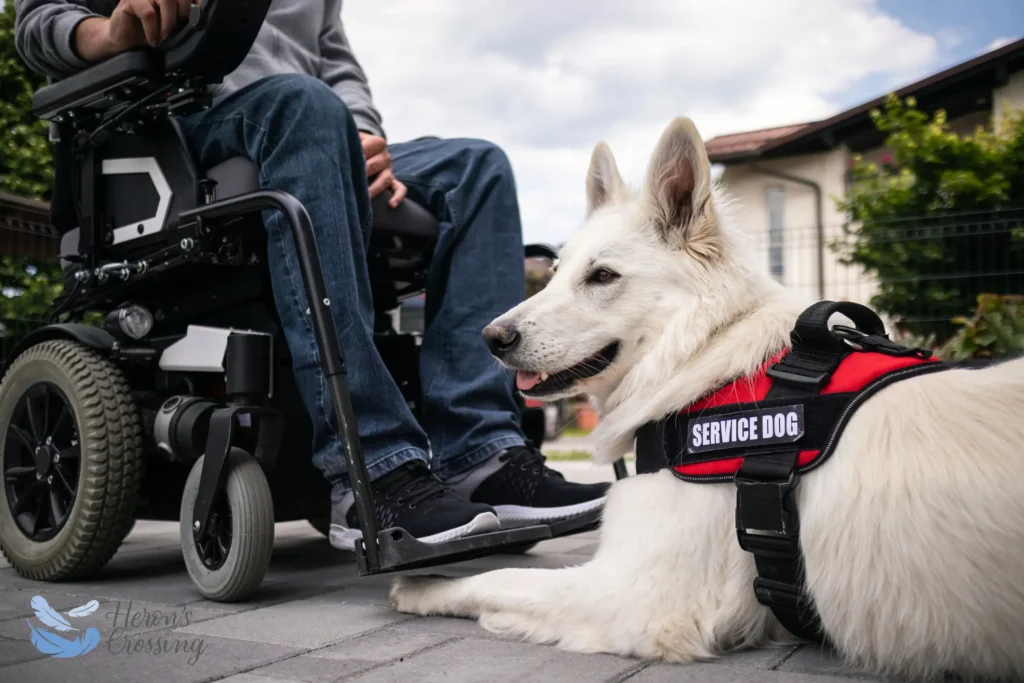Dogs are very special, natural helpers. They develop close bonds with us, which is unusual for most animals, and they eagerly enjoy helping the people they care for.
They can be trained to help disabled people perform basic activities that so many of us take for granted. This keeps those who have disabilities staying actively involved and socializing, for better overall health and happiness.
Some mobility assistance dogs help to guide their handler by using a special harness built with a sturdy handle or sometimes cane to gently lead them forward to their destination.
Big, strong dogs are trained to pull those who are wheel-chair bound. Other strong dogs walk alongside their handler to stabilize them in case they lose their balance or feel faint. The person would not put their weight entirely upon their dog, but simply lean into the dog, as the dog leans into them, to add stability.
The official term for these trained canine helpers is Brace and Mobility Support Dog (BMSD) but most people simply call them mobility assistance dogs.
BMS dogs are also trained to help their handlers navigate stairs and maneuver from bed to chair, or act as a guardrail to keep someone with an unstable gait from bumping into things.
They carry objects and backpacks, pick up things that fall, retrieve things that are out of reach, tap door-opening activators and elevator buttons, turn light switches on and off, use pull ropes to open cabinets and drawers, and even open and close the refrigerator.
In addition, these smart dogs are taught to determine when danger exists, using ‘intelligent disobedience’ to refuse a command that may result in harm to the handler, and also to manage emergency situations where the handler needs help. They will roll their handler over to enable breathing if they become unconscious, and tap on a device to call for help. In public, they’ll stand over their handler to protect them, and bark for help.
The dogs who are best suited for service love to be with people. They are empathetic and patient, and are able to remember as much as 200 hours of special training.
Retrievers, German Shepherds and Poodles are often bred to be assistance animals. But an average dog – perhaps one waiting in a shelter – may be your angel in disguise.
Raising, housing and training assistance dogs costs thousands of dollars. Volunteer work and donations help a lot. Still, applicants must pay a high cost for a trained dog, and may need to get financial assistance through fundraisers. Some training schools will show the applicant how to do that.
Service dogs walk a lot more and bear more burdens than many dogs. Veterinary costs for optimum health can be substantial, and the necessity for keeping such an important helper in good health is crucial. So some organizations such as Canine Assistance have an after-care program where donors can help with veterinary costs for service dogs.
In Atlanta, Dog Training Elite helps those who may not be able to afford an assistance dog by providing a fully trained dog, or a puppy to train with, or they will work with a dog the handler has chosen, if the dog is trainable.
When choosing a trainer or training academy, find out where you will be training. Do you have to go to their academy to do final training with your new dog? Will they do it online, or in local small groups? Do they have trainers that will come to your home, office or at school? Will they stay in touch throughout your dog’s career to answer questions, check on the dog and provide additional training as needed?
Also, find out how your dog is trained. Look for trainers who use positive reinforcement, a reward that may come in the form of a treat, a toy, praise or petting, rather than those who use negative reinforcement with choke chains and shock collars.
Canine Assistance in Milton, Georgia, raises pups to help with mobility for children. The children are much more comfortable in social settings with their dog by their side. This group also has a unique K-9 Kids reading program where children with speaking difficulties can become accustomed to reading out loud to an attentive dog audience who visits their school.
Little Angels Service Dogs has a different kind of offshoot assistance program, home fostering their puppies at the local women’s prison. These dogs will grow up already accustomed to being in busy places while staying with one special person..
There are several other assistance programs that create affordable mobility opportunities in different ways. The stated goal of Tails of Hope in Gay, Georgia, is to “change lives at both ends of the leash” by bringing in abandoned and surrendered dogs that have what it takes to be service dogs for veterans and civilians with brain injuries that cause mobility issues.
The best place to start looking for a mobility assistance dog is to contact your doctor for referrals, and also contact the non-profit association for your disability.
A single trained dog can touch the hearts of so many! For those who have a special place in their own hearts for these dogs, there are many ways to get involved as a donor or volunteer, to support their selfless work.
Heron’s Crossing provides end-of-life care for pets in the Metro Atlanta area. In-home appointments with compassionate vets are available. If you’d prefer a home-like setting away from your home, our Decatur office is also available by appointment.

